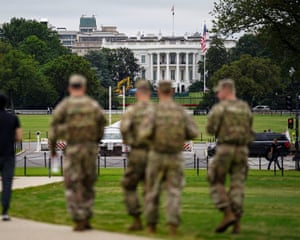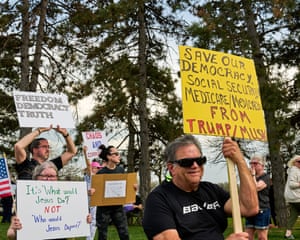
SkyWater pitches itself as all-American firm as Trump mulls more equity deals following Intel deal
Entities mentioned:
- Donald Trump: Power, Control, Influence
- Intel: Self-preservation, Competitive spirit, Security
- SkyWater Technology: Competitive spirit, Patriotism, Security
- Ross Miller: Professional pride, Influence, Patriotism
- GlobalFoundries: Self-preservation, Competitive spirit, Security
- Micron Technology: Competitive spirit, Security, Influence
- Jai Kedia: Professional pride, Wariness, Justice
Article Assessment:
Credibility Score: 70/100
Bias Rating: 65/100 (Lean Right)
Sentiment Score: 55/100
Authoritarianism Risk: 60/100 (Mixed/Neutral)
Bias Analysis:
The article leans slightly right, focusing on Trump's policy and giving more space to supportive voices. While it includes criticism, the overall framing appears to favor the administration's approach.
Key metric: U.S. Domestic Semiconductor Production Capacity
As a social scientist, I analyze that this article highlights a significant shift in U.S. economic policy towards government ownership in private companies, particularly in the semiconductor industry. This approach, spearheaded by President Trump, aims to strengthen domestic production and national security. The government's equity stake in Intel sets a precedent that could extend to other semiconductor companies. This policy change could potentially increase U.S. semiconductor production capacity by incentivizing domestic investment and ensuring accountability for federal funds. However, it also raises concerns about market distortion, favoritism, and a move towards more government intervention in the economy. The long-term impact on the industry's competitiveness and innovation remains uncertain, as does the potential for international repercussions in trade and diplomacy.

Charlamagne tha God argues flag-burners 'don't give a damn about America' after Trump executive order
Entities mentioned:
- Charlamagne tha God: Patriotism, Righteousness, Duty
- President Donald Trump: Control, Patriotism, Power
- White House: Control, Patriotism, Security
- Supreme Court: Justice, Duty, Freedom
Article Assessment:
Credibility Score: 70/100
Bias Rating: 65/100 (Lean Right)
Sentiment Score: 35/100
Authoritarianism Risk: 60/100 (Mixed/Neutral)
Bias Analysis:
The article leans right, primarily due to its focus on a conservative radio host's perspective and the prominence given to the White House statement. While it includes some opposing viewpoints, the framing tends to favor anti-flag burning sentiments.
Key metric: Social Cohesion
As a social scientist, I analyze that this article highlights a tension between freedom of expression and patriotic sentiment in the United States. The discussion around flag burning touches on deep-seated issues of national identity, constitutional rights, and the limits of protest. Charlamagne tha God's perspective, while acknowledging free speech, questions the patriotism of those who burn the flag. This debate reflects broader societal divisions on what constitutes appropriate forms of protest and the meaning of patriotism. The executive order by President Trump signals an attempt to reinterpret established legal precedent, potentially impacting civil liberties. This controversy may exacerbate existing political polarization and challenge the balance between national unity and individual rights.

Fight over policing DC moves to Congress as parties split on control
Entities mentioned:
- U.S. Congress: Power, Control, Influence
- Washington D.C.: Self-preservation, Freedom, Security
- President Trump: Power, Control, Influence
- Republican Party: Control, Power, Righteousness
- Democratic Party: Justice, Freedom, Unity
- Rep. Andy Biggs: Control, Righteousness, Ambition
- Rep. Anna Paulina Luna: Control, Power, Loyalty
- Rep. Andy Ogles: Control, Power, Loyalty
- Sen. Mike Lee: Control, Power, Righteousness
- Rep. James Comer: Control, Righteousness, Professional pride
Article Assessment:
Credibility Score: 75/100
Bias Rating: 55/100 (Center)
Sentiment Score: 40/100
Authoritarianism Risk: 65/100 (Authoritarian Tendencies)
Bias Analysis:
The article presents multiple viewpoints and provides context for both Republican and Democratic positions. While it leans slightly towards emphasizing Republican actions, it also acknowledges potential drawbacks and Democratic counter-arguments.
Key metric: Federal-Local Government Relations
As a social scientist, I analyze that this article highlights a significant power struggle between federal and local government, specifically focusing on Washington D.C.'s home rule. The debate over policing in D.C. serves as a microcosm for broader issues of federalism and local autonomy in the United States. The Republican efforts to increase federal control over D.C. reflect a trend towards centralization of power, while Democratic resistance aims to maintain local governance. This conflict has implications for the balance of power between federal and local authorities, potentially setting precedents that could affect other cities. The article also underscores the political nature of crime and policing issues, with both parties attempting to leverage these topics for electoral advantage. The complexity of D.C.'s unique status as a federal district further complicates the issue, highlighting the ongoing challenges in American federalism.

Death penalty could return in nation's capital under Trump’s DC crime crackdown
Entities mentioned:
- Donald Trump: Control, Power, Righteousness
- U.S. Supreme Court: Justice, Duty, Influence
- D.C. Council: Justice, Duty, Unity
- Death Penalty Information Center: Justice, Duty, Curiosity
- U.S. Attorney Jeanine Pirro: Justice, Duty, Professional pride
- Metropolitan Police Department: Duty, Security, Professional pride
- D.C. National Guard: Duty, Security, Loyalty
Article Assessment:
Credibility Score: 70/100
Bias Rating: 65/100 (Lean Right)
Sentiment Score: 35/100
Authoritarianism Risk: 75/100 (Authoritarian Tendencies)
Bias Analysis:
The article leans right, primarily due to its focus on Trump's perspective and actions without significant counterbalancing viewpoints. It presents the administration's claims about crime reduction uncritically, without exploring alternative explanations or critiques.
Key metric: Crime Rate in Washington D.C.
As a social scientist, I analyze that this article presents a significant shift in criminal justice policy for Washington D.C., with potential far-reaching implications. The proposed reintroduction of the death penalty, coupled with increased military and federal law enforcement presence, represents a dramatic escalation in the approach to crime prevention and punishment. This policy shift could potentially impact the crime rate in several ways: it may serve as a deterrent for serious crimes, but it could also escalate tensions between law enforcement and communities, potentially leading to increased unrest. The use of military forces for domestic law enforcement raises questions about the balance between security and civil liberties. The effectiveness of such measures on long-term crime reduction is debatable, as research on the deterrent effect of the death penalty is inconclusive. This approach also diverges from recent trends in criminal justice reform focusing on rehabilitation and addressing root causes of crime.

DNC panel fails to advance dueling resolutions on Israel’s war in Gaza
Entities mentioned:
- Democratic National Committee: Unity, Influence, Control
- Ken Martin: Unity, Control, Duty
- Progressives: Moral outrage, Justice, Influence
- Israel: Self-preservation, Security, Control
- Hamas: Power, Control, Revenge
- Allison Minnerly: Moral outrage, Justice, Influence
- Democratic Majority for Israel: Loyalty, Security, Influence
Article Assessment:
Credibility Score: 75/100
Bias Rating: 45/100 (Center)
Sentiment Score: 35/100
Authoritarianism Risk: 25/100 (Generally Democratic)
Bias Analysis:
The article presents multiple viewpoints and includes direct quotes from various stakeholders, indicating an attempt at balanced reporting. However, there's slightly more emphasis on the progressive perspective, which may suggest a slight lean towards the center-left.
Key metric: Democratic Party Unity
As a social scientist, I analyze that this article highlights significant internal divisions within the Democratic Party over the Israel-Gaza conflict. The failure to advance either resolution and the decision to refer the issue to a task force demonstrates the party's struggle to find a unified stance on a highly contentious foreign policy issue. This internal conflict could potentially impact voter enthusiasm and party cohesion, especially among younger and more progressive Democrats who are increasingly critical of Israel's actions in Gaza. The party leadership's attempt to balance various factions' interests while maintaining traditional support for Israel is proving challenging, reflecting broader shifts in public opinion and generational differences within the party. This situation may have implications for Democratic electoral performance, particularly in mobilizing the party's base.

Judge tosses Trump administration’s lawsuit against Maryland’s 15 federal judges, calling it a ‘constitutional free-for-all’
Entities mentioned:
- Judge Thomas Cullen: Justice, Duty, Righteousness
- Trump administration: Power, Control, Self-preservation
- Justice Department: Control, Power, Righteousness
- Maryland federal judges: Duty, Justice, Professional pride
- Kilmar Abrego Garcia: Self-preservation, Security, Freedom
Article Assessment:
Credibility Score: 75/100
Bias Rating: 45/100 (Center)
Sentiment Score: 35/100
Authoritarianism Risk: 65/100 (Authoritarian Tendencies)
Bias Analysis:
The article presents both sides of the issue, quoting from the judge's ruling and describing the administration's position. While some language choices may slightly favor the judicial perspective, the overall presentation is balanced and fact-based.
Key metric: Rule of Law Index
As a social scientist, I analyze that this case represents a significant challenge to the separation of powers and judicial independence in the United States. The Trump administration's attempt to sue federal judges for their rulings on immigration cases is an unprecedented move that could potentially undermine the judiciary's role in providing checks and balances. Judge Cullen's dismissal of the case reinforces the importance of judicial immunity and the proper channels for addressing concerns between branches of government. This ruling likely strengthens the Rule of Law Index by maintaining the integrity of the judicial system against executive overreach. However, the administration's rhetoric and actions against judges who rule against it may have longer-term negative impacts on public trust in the judiciary and the overall strength of democratic institutions.

Abrego Garcia renews bid for asylum as fight over Trump admin’s attempt to re-deport him heats up
Entities mentioned:
- Kilmar Abrego Garcia: Self-preservation, Security, Justice
- Trump administration: Control, Power, Righteousness
- Justice Department: Duty, Control, Justice
- MS-13: Power, Control, Fear
Article Assessment:
Credibility Score: 75/100
Bias Rating: 40/100 (Lean Left)
Sentiment Score: 35/100
Authoritarianism Risk: 65/100 (Authoritarian Tendencies)
Bias Analysis:
The article leans slightly left, presenting Abrego Garcia's case sympathetically and emphasizing potential rights violations. While it includes the administration's perspective, it gives more space to arguments supporting Abrego Garcia's asylum bid.
Key metric: Immigration Court Backlog
As a social scientist, I analyze that this case highlights the complexities and contradictions in the U.S. immigration system. The renewed asylum bid by Abrego Garcia represents a challenge to the Trump administration's aggressive deportation policies, potentially impacting the Immigration Court Backlog. The case underscores tensions between national security concerns, human rights obligations, and due process in immigration proceedings. The wrongful deportation and subsequent legal battles reflect systemic issues in immigration enforcement and the potential for rights violations. This case may set precedents for similar cases and influence public perception of immigration policies.

DOGE put Americans’ Social Security records at risk, whistleblower says
Entities mentioned:
- Department of Government Efficiency: Efficiency, Duty, Professional pride
- Social Security Administration: Security, Duty, Professional pride
- Charles Borges: Duty, Righteousness, Security
- Government Accountability Project: Justice, Transparency, Duty
- Office of Special Counsel: Justice, Duty, Security
- Trump administration: Power, Control, Influence
- Elon Musk: Ambition, Influence, Control
- DOGE team: Efficiency, Control, Influence
- Supreme Court: Justice, Duty, Control
- Nick Perrine: Professional pride, Security, Duty
Article Assessment:
Credibility Score: 75/100
Bias Rating: 45/100 (Center)
Sentiment Score: 25/100
Authoritarianism Risk: 35/100 (Generally Democratic)
Bias Analysis:
The article presents multiple perspectives, including the whistleblower, the agency, and concerned groups. It maintains a neutral tone while reporting on a controversial issue, balancing criticism with official responses.
Key metric: Data Security and Privacy
As a social scientist, I analyze that this article highlights a significant breach in data security practices within a major government agency, potentially affecting millions of Americans. The whistleblower's complaint suggests a systemic failure in protecting sensitive personal information, which could have far-reaching consequences for individual privacy and national security. The involvement of private sector entities (DOGE team) in accessing government data raises questions about the balance between modernization efforts and data protection. This situation reflects broader tensions between technological advancement, government efficiency, and the safeguarding of personal information in the digital age. The response from the Social Security Administration appears to downplay the severity of the issue, which may indicate a disconnect between internal perceptions of security and actual vulnerabilities. This incident could lead to decreased public trust in government institutions and their ability to protect citizens' data, potentially impacting social cohesion and civic engagement.

Marjorie Taylor Greene joins Bernie Sanders in urging US to end Gaza famine
Entities mentioned:
- Marjorie Taylor Greene: Ambition, Influence, Recognition
- Bernie Sanders: Righteousness, Justice, Moral outrage
- Donald Trump: Power, Control, Self-preservation
- California Governor: Competitive spirit, Determination, Professional pride
- Kilmar Ábrego García: Self-preservation, Security, Freedom
Article Assessment:
Credibility Score: 70/100
Bias Rating: 40/100 (Lean Left)
Sentiment Score: 30/100
Authoritarianism Risk: 45/100 (Mixed/Neutral)
Bias Analysis:
The headlines suggest a slight left-leaning bias, with more critical framing of Trump and conservative policies. However, diverse perspectives are represented, including conservative viewpoints, indicating an attempt at balanced coverage.
Key metric: Immigration and Integration
As a social scientist, I analyze that this collection of headlines reflects a complex political landscape surrounding immigration issues in the United States. The unexpected alignment of far-right Greene with progressive Sanders on Gaza indicates a potential shift in traditional party lines on international humanitarian issues. The Maine oysterman's Senate run suggests growing political engagement from non-traditional candidates, possibly due to dissatisfaction with current leadership. The California governor's confrontational stance against Trump highlights the intensifying political polarization. Trump's legal strategies and focus on immigration demonstrate his continued influence on Republican policy priorities. The decline in US immigrant population after 50 years of growth signifies a major demographic shift, likely influenced by stricter immigration policies and enforcement. This shift could have significant long-term impacts on the US economy, social fabric, and political landscape.

Fema staff warn Trump’s cuts risk exposing US to another Hurricane Katrina
Entities mentioned:
- FEMA staff: Professional pride, Duty, Security
- Donald Trump: Power, Control, Influence
- Hurricane Katrina victims: Self-preservation, Security, Fear
Article Assessment:
Credibility Score: 70/100
Bias Rating: 35/100 (Lean Left)
Sentiment Score: 25/100
Authoritarianism Risk: 30/100 (Generally Democratic)
Bias Analysis:
The article leans left, evidenced by its critical tone towards Trump's policies and the emphasis on potential negative outcomes. However, it does present factual information from FEMA staff, lending some balance to the reporting.
Key metric: Disaster Preparedness and Response Effectiveness
As a social scientist, I analyze that the article highlights a significant concern regarding the Trump administration's proposed budget cuts to FEMA and their potential impact on disaster preparedness. The reference to Hurricane Katrina serves as a stark reminder of the consequences of inadequate disaster response. This situation may lead to decreased capacity for emergency management, potentially leaving vulnerable populations at higher risk during natural disasters. The warnings from FEMA staff underscore a conflict between fiscal policy goals and public safety needs, reflecting broader tensions in governance and resource allocation.